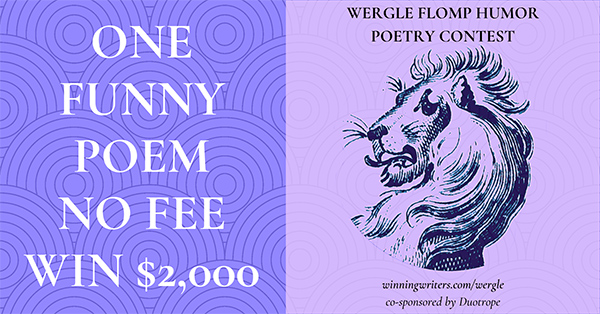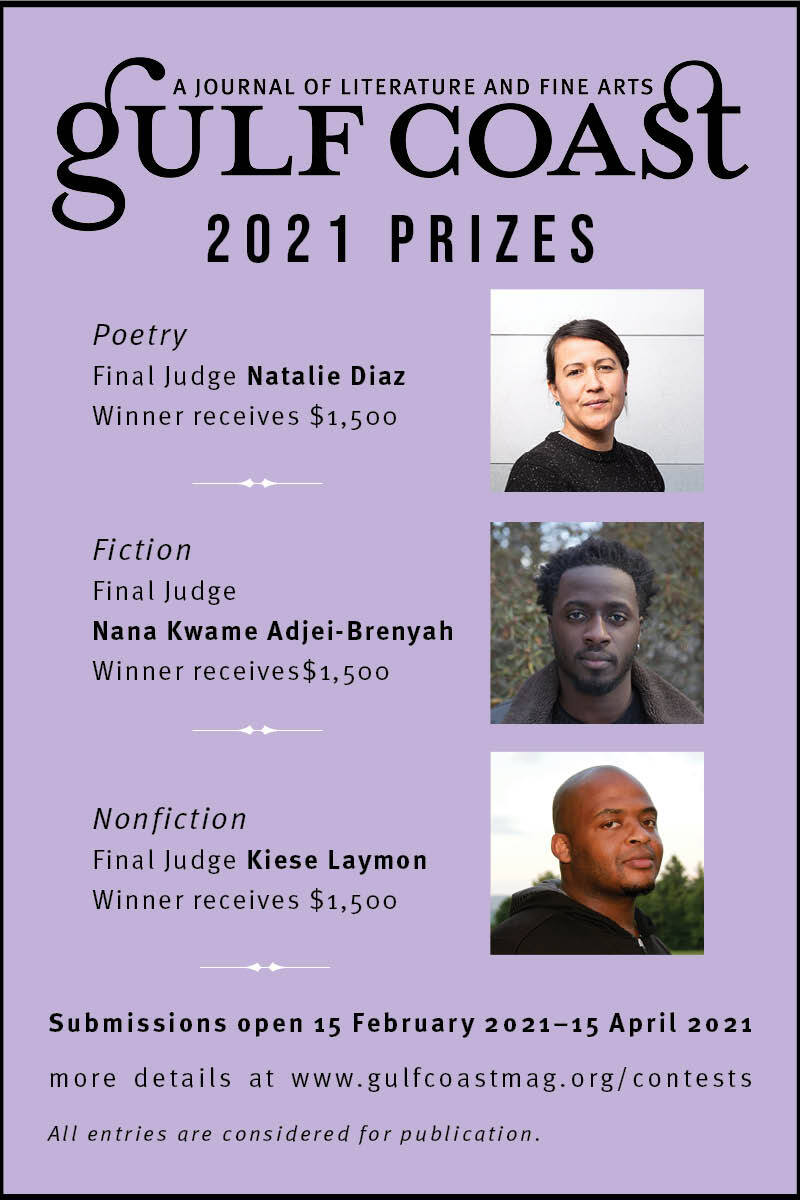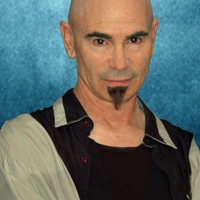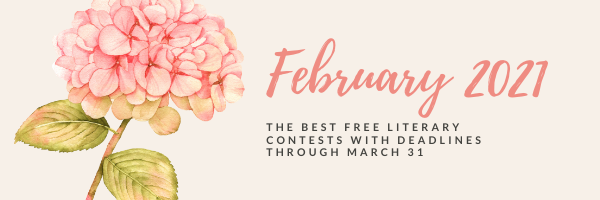
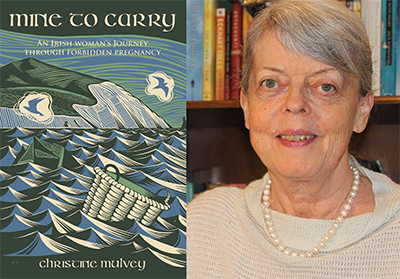
We are thrilled to announce the results from our sixth annual North Street Book Prize for self-published books. We read 1,915 entries! Christine Mulvey of Grass Valley, California won this year's Grand Prize across all genres for her gorgeous, devastating memoir, Mine to Carry. Say the judges, "The writing is a perfectly woven tapestry of lyric description, narrative, dialogue, story, and philosophical and religious musings." Ms. Mulvey
received $5,000, a marketing analysis and one-hour phone consultation with Carolyn Howard-Johnson, a $300 credit at BookBaby, and 3 free ads in the Winning Writers newsletter (a $525 value).
We further congratulate our category winners, Jerald Pope (Children's Picture Book), Ingrid Pierre (Graphic Novel & Memoir), Caleb Rainey (Poetry), Alicia Doyle (Creative Nonfiction & Memoir), Jolie P. Hoang (Mainstream/Literary Fiction), and Rachael A.Z. Mutabingwa (Genre Fiction). Emma Sondergaard, Zarle Williams, Omaha Perez, Toni Thomas, Ying Qian, Dennis Reed, Marian Pierce, and Rashid Darden earned Honorable Mentions.
Final judges Jendi Reiter and Ellen LaFleche were assisted by Jim DuBois and Annie Mydla. Read excerpts from all the winning entries and the judges' remarks. Read the press release.
$13,000 was awarded in all, making this one of the world's most generous contests for self-published books. Sharp-eyed people will notice we awarded two more Honorable Mentions than promised—we couldn't choose just six! Our new competition opens today, with a deadline of June 30. We are increasing the prize pool to $13,750 with the addition of a new category, Art Book. The entry fee remains $65 per book. ENTER HERE.
 We found three dozen excellent free poetry and prose contests with deadlines between February 15-March 31. In this issue, please enjoy "Spring and Fall" by Gerard Manley Hopkins, illustrated by Julian Peters. We found three dozen excellent free poetry and prose contests with deadlines between February 15-March 31. In this issue, please enjoy "Spring and Fall" by Gerard Manley Hopkins, illustrated by Julian Peters.
 Thanks so much for all of you who helped us get our Twitter feed back online after we made a mistake in our profile. Some people even went to the trouble of sending letters to Twitter in San Francisco! Thanks so much for all of you who helped us get our Twitter feed back online after we made a mistake in our profile. Some people even went to the trouble of sending letters to Twitter in San Francisco!
View past newsletters in our archives. Need assistance? Let us help. Join our 135,000 followers on Twitter and find us on Facebook. Advertise with
us, starting at $40.
|
Congratulations to Alan W. King, Naila Moreira, Sally Bellerose, Kate Szegda, Cyrée Jarelle Johnson, Annie Dawid, Phyllis Klein, Scott Piner, David Kherdian, Susan Stinson, and Aadil Farook.
Winning Writers editor Jendi Reiter's poems "Close", "Soul Contract", and "Lower East Side Playground, 1974, 2014" will be published in Atelier of Healing: Poetry About Trauma and Recovery, an online anthology from Squircle Line Press. The book launch is planned for mid-2021 at Poetry Festival Singapore. The theme of this year's festival is "Catharsis" and submissions are open through June 28. In other news, Jendi's chapbook manuscript Made Man was a semifinalist in the 2020 Chad Walsh Poetry Chapbook Contest from Beloit Poetry Journal.
Winning Writers contest judge Soma Mei Sheng Frazier's story "Face" will be included in Home Is Where You Queer Your Heart, an anthology forthcoming this year from Foglifter Press. This book of poetry and prose will look at the complicated meanings of "home" for LGBTQ people.
Learn about our subscribers' achievements and see links to samples of their work.
Have news? Please email it to jendi@winningwriters.com.
|
First Prize for Creative Nonfiction & Memoir, North Street Book Prize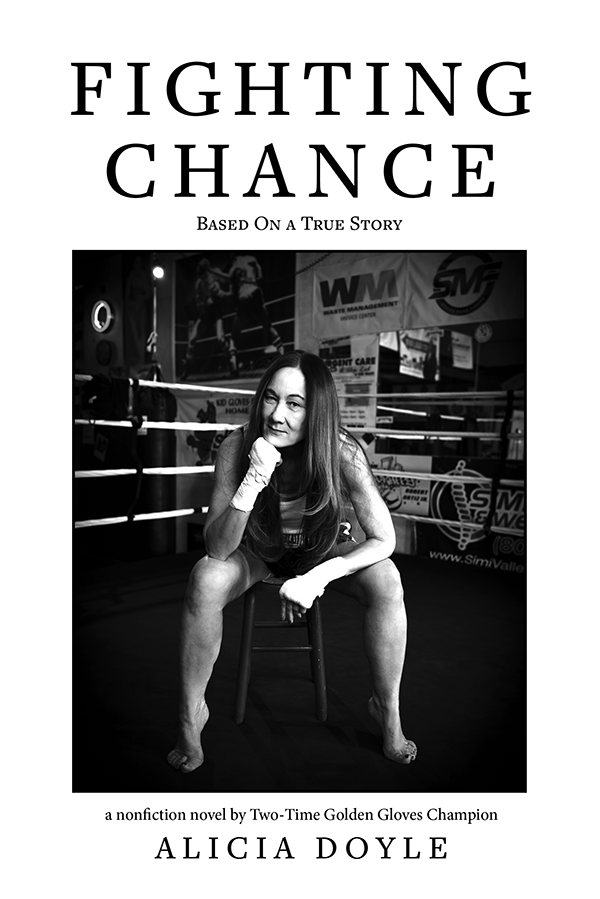
Based on a true story, Fighting Chance is written by Alicia Doyle, an award-winning journalist who discovered boxing at age twenty-eight in the late 1990s when she went on assignment at Kid Gloves, a boxing gym for at-risk youth. For two years, she simultaneously worked as a newspaper reporter while training and competing as a boxer, making her one of only a few hundred women in America who infiltrated this male-dominated sport. During her boxing career, she won two Golden Gloves championship titles and earned three wins by knockout. Her pro debut at age thirty in the year 2000 was named The California Female Fight of the Year. Fighting Chance offers an inside look at what's considered the toughest sport known to man.
"A unique and unreservedly recommended addition to community and college/university library Contemporary American Women Biography collections in general, and American Boxing History supplemental studies lists in particular. Fighting Chance is exceptionally well written, organized and presented."
—Mary Cowper, Midwest Book Review
"The tale is raw, revealing, deep and hopeful in ways that bring to mind Maya Angelou's book, I Know Why the Caged Bird Sings...Doyle skillfully weaves in the story of her troubled childhood and youth, finding there the origins of the anger and resentments that boxing, in her adult life, provided a channel to fight through. In a fascinating way, it was her journey into boxing that eventually brought her back into touch with estranged parents and siblings, in a process of spiritual growth and healing that ended in letting go of anger, making peace with the past, and reconciling with family.
"Looking back on her boxing career, Doyle writes, 'boxing was a catalyst for my transformation – a sport filled with metaphors that helped me view my life differently. Boxing wasn't about fighting in the ring. It was about fighting my self...It was about knocking out my inner demons of the past, facing my memories in the eye, and remaining fearless no matter how much they frightened me. The hardest part was learning how to embrace my darkest pain and love the broken parts of myself…'
"Truly an inspiring story, in so many ways."
—L. Tuman
See the North Street judges' remarks, read an excerpt, and buy Fighting Chance on Amazon.
|
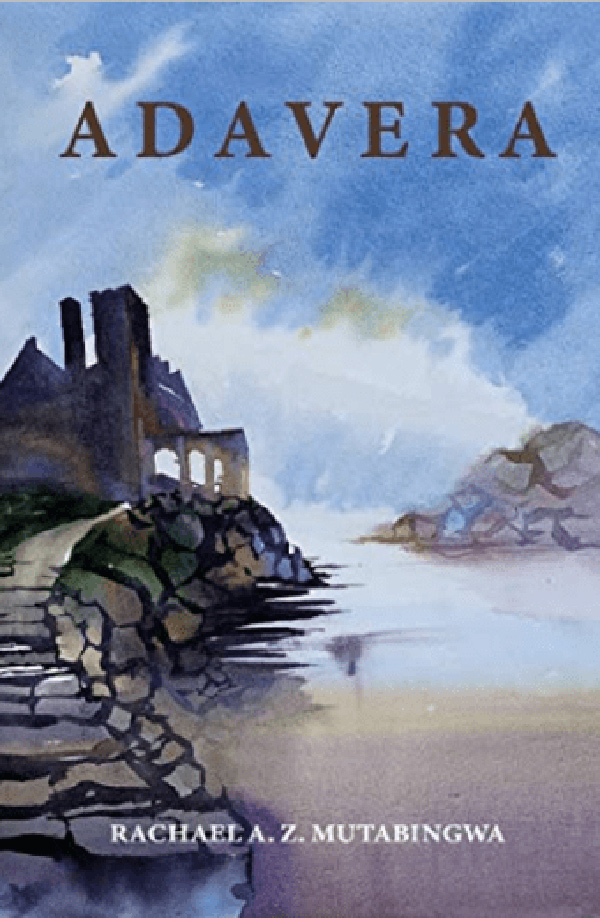
The prequel to Kunda, winner of First Prize for Genre Fiction in the 2020 North Street competition.
Preston Pakello's life seems to begin only when the death of a stranger brings three sisters to his home, the Island of Adavera. His life becomes intricately intertwined with theirs, and the journey each one takes leaves a trail for the other to follow. All the while, the Island keeps a careful watch.
"The book is written from multiple perspectives which makes the story that much richer. The reader is able to discover the world of Adavera through the eyes of Preston and the Nvaleroah sisters. I was not expecting the emotions that I had while reading this book. I cried, I laughed, and then I was left stumped when I was done reading, staring at the book, wondering what to do with my life. It is a journey to self-discovery, a journey to discovery of purpose."
—Mable Amuron
Buy Adavera on Amazon.
|
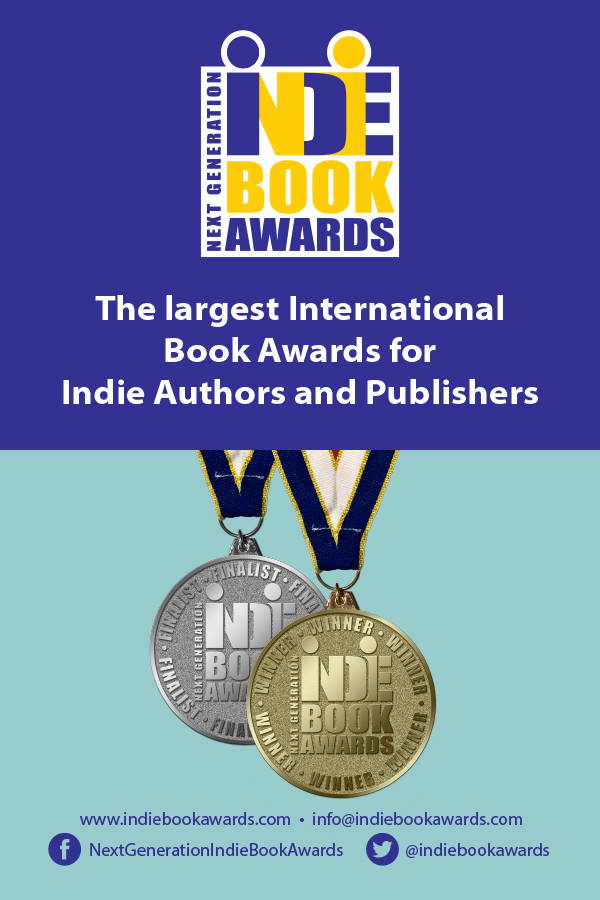
Deadline: EXTENDED! (see website for details)
Entries are now being accepted for the 2021 Next Generation Indie Book Awards, the most exciting and rewarding book awards program open to independent publishers and authors worldwide who have a book written in English and released in 2019, 2020 or 2021 or with a 2019, 2020 or 2021 copyright date. The Next Generation Indie Book Awards is presented by Independent Book Publishing Professionals Group.
With over 70 categories to choose from, enter to take advantage of this exciting opportunity to have your book considered for cash prizes, awards, exposure, possible representation by a leading literary agent, and recognition as one of the top independently published books of the year!
|
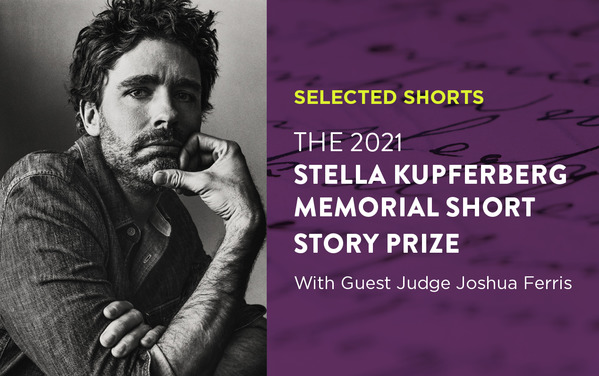
The Stella Kupferberg Memorial Short Story Prize is a writing competition sponsored by the stage and radio series Selected Shorts. The 2021 contest will be judged by author Joshua Ferris. The winning work will be performed and recorded by an actor this spring and published on Electric Literature. The winning writer will receive $1,000 and a free 10-week course with Gotham Writers.
The contest is open and you may enter HERE.
Please enjoy "Prayer for the Ides of February" by Caitlin Campbell, our 2020 contest winner.
|
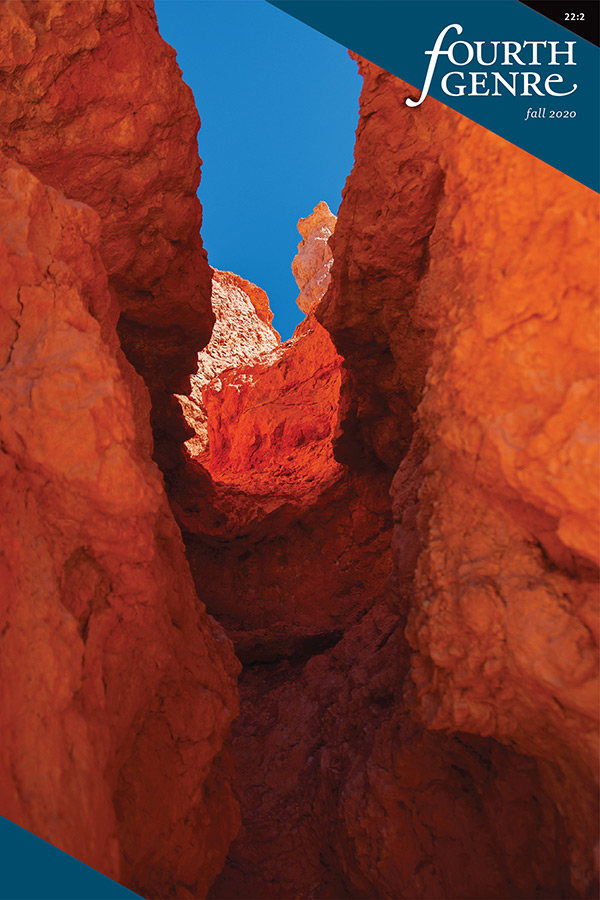
Deadline: March 15
The Fourth Genre Steinberg Memorial Essay Prize welcomes unpublished submissions via Duosuma. The winning author receives $1,000 and publication in the issue of Fourth Genre that's featured at AWP. $20 fee per entry. Length limit: 6,000 words. Nonfiction only, please. See the detailed submission guidelines on our website.
Our 2021 contest judge is Xu Xi. Get to know her here.
We congratulate Sean Enfield, author of "The Revolution will be Revised" on winning our 2020 contest. His essay was selected by Laura Julier, former editor of Fourth Genre.
About Enfield's essay, Laura Julier wrote: "The author raises questions about how to engage, how to be present, how to be, in a cultural context that is so mediated by (among other things) media and screens. Above all, the essay raises questions about how to create and develop an identity outside of the multiple narratives that tug at us, another voice in a conversation inhabited by the likes of Didion and Baldwin. It is an accomplishment worth circulating widely."
|
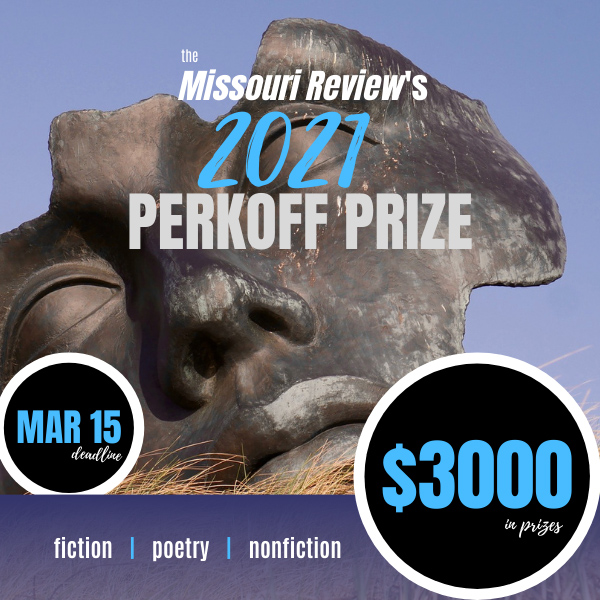
Deadline: March 15
The re-vamped Perkoff Prize is a tri-genre contest that will award $1,000 and publication each to writers of the best story, set of poems, and essay that engage in evocative ways with health and medicine as judged by the editors. Submit unpublished work.
The initial concept for the Perkoff Prize was as a post-publication award (much like TMR's Peden Prize) that recognized literary excellence in a piece that had a meaningful connection to health and medicine. The original benefactor of this prize, the late Dr. Gerald Thomas Perkoff, was Professor Emeritus at the University of Missouri School of Medicine in the Department of Family and Community Medicine (learn more about his life here). His love of poetry and the possibilities in treating the vast, rich arena of human experience with health and medicine drove this desire to take note of and reward literary achievement.
We started brainstorming and planning ways to reinvent and revitalize the prize in the late spring of 2019, with no idea what 2020 would bring us. Now we are here in 2021, at what we all hope is the beginning of the end of a pandemic that has relentlessly revealed to us the precarity—and resourcefulness—of human health and the endeavors of medicine to relieve pain and suffering.
Learn more and submit online or by mail.
|
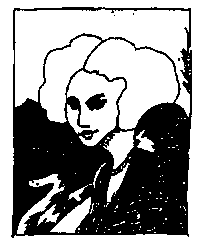
Serena McDonald Kennedy Award
Deadline extended to March 31
This award was created by Barbara Passmore, friend of Snake Nation Press, to honor her grandmother. Barbara passed away this year at the age of 92 and we continue her wishes. Submit a novella (up to 50,000 words) or a collection of short stories (up to 200 pages). Previously published works may be entered. Entry fee: $25. Winner receives $1,000 and publication. We congratulate our 2018 winner Carol Roan for A Change in the Air.

Violet Reed Haas Prize for Poetry Award
Deadline extended to March 31
Submit a poetry manuscript of 50-75 pages. Entry fee: $25. Winner receives $1,000 and publication. We congratulate our 2018 winner Sara Claytor for Keeping Company With Ghosts.
To enter electronically, please email your entry to snake.nation.press@gmail.com, then choose a link below to make your payment:
Fiction
Poetry
You may also mail your entry and fee (payable to Snake Nation Press) to:
Snake Nation Press
P.O. Box 98
Ray City, GA 31645
If you submitted an entry to either contest in 2019, it will be included in the contests above.
|
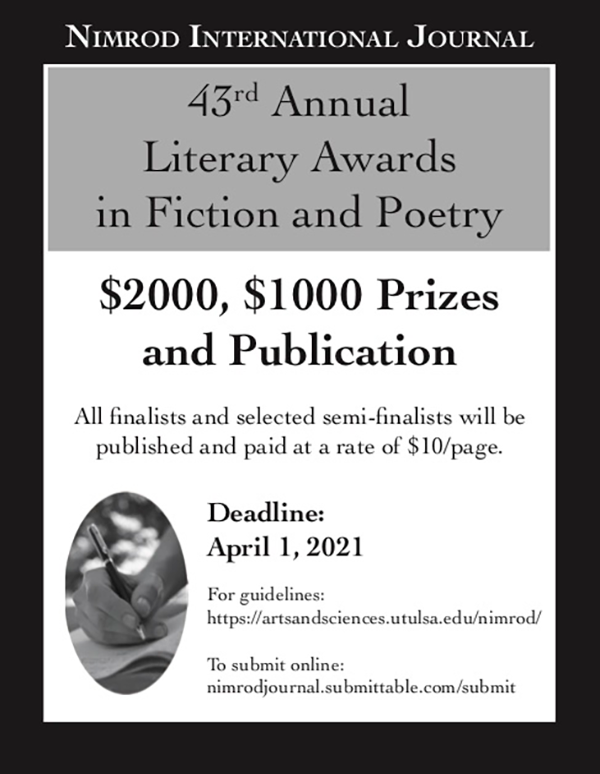
Deadline: April 1
The 43rd annual Nimrod Literary Awards—The Pablo Neruda Prize for Poetry and The Katherine Anne Porter Prize for Fiction—are open. Judged by Geffrey Davis and Rilla Askew, the Awards offer first prizes of $2,000 and publication and second prizes of $1,000 and publication. Winners will also take part in a virtual Awards Ceremony and Reading in October. All finalists and selected semi-finalists will be published at a rate of $10 per page.
Guidelines:
• Poetry: 3-10 pages
• Fiction: 7,500 words maximum
• Fee Per Entry: $20 payable to Nimrod, includes a one-year subscription
No previously published works or works accepted for publication elsewhere. Author's name must not appear on the manuscript. Include a cover sheet containing major title(s), author's name, full address, phone, and email. Entries may be mailed to Nimrod or submitted online.
For complete rules, visit Nimrod's website.
|
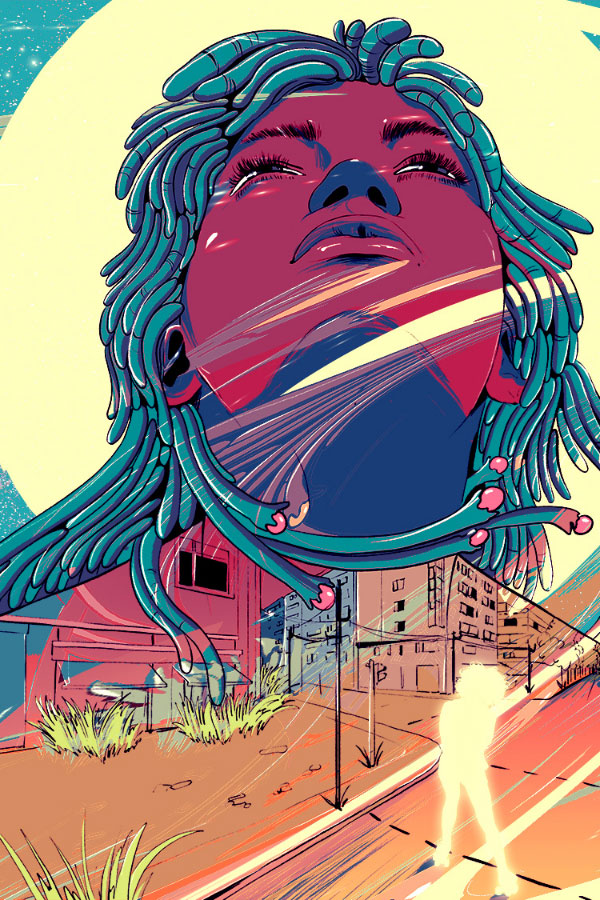
$8,700 IN PRIZES AND PUBLICATION
Deadline: April 12 | No entry fee
Fix, Grist's solutions lab, is launching a new climate-fiction contest, Imagine 2200: Climate Fiction for Future Ancestors. Imagine calls for unpublished short stories (3,000-5,000 words) that envision the next 180 years of climate progress. Judges include renowned authors adrienne maree brown, Kiese Laymon, and Morgan Jerkins. Imagine draws inspiration from Afrofuturism, as well as Indigenous, Latinx, Asian, disabled, feminist, and queer futures, and the genres of hopepunk and solarpunk. We want to see—and share—stories that center climate solutions from the most impacted communities, and bring into focus what a truly regenerative future could look like.
The top three contest winners will be awarded $3,000, $2,000, and $1,000 respectively, and nine finalists will receive a $300 honorarium. Winners and finalists will be published in an immersive digital collection. Conjure your wildest dreams for society—all the sweet, sweet justice, resilience, and abundance we could realize—and put those dreams on paper.
There's no fee to enter, so if you’re ready to get writing, you can find our submissions portal here. And if you'd like to get in touch, please reach us at imaginefiction@grist.org.
Illustration by Carolina Rodríguez Fuenmayor
|
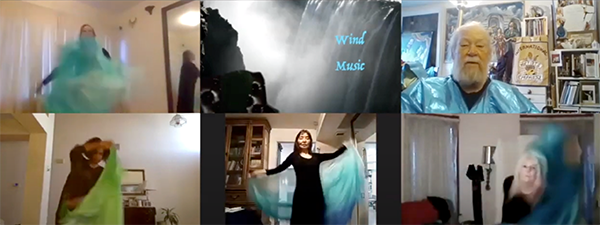
Deadline: April 15
Now in its 28th year, all Dancing Poetry Festival prize winners will receive a prize certificate suitable for framing, a ticket to the 2021 Dancing Poetry Festival at the Palace of the Legion of Honor in San Francisco, and an invitation to read their prizewinning poem at the festival. (The festival may be held online if circumstances require.)
Three Grand Prizes will receive $100 each plus their poems will be danced and filmed. Many smaller prizes. Each Grand Prize winner will be invited onstage for photo ops with the dancers and a bow in the limelight.
See video and pictures from our Dancing Poetry Festivals that show the vast diversity of poetry and dance we present each year. For poetry, we look for something new and different including new twists to old themes, different looks at common situations, and innovative concepts for dynamic, thought-provoking entertainment. Please do not feel constrained to submit a poem about dancing. The entry fee is just $5 for one poem and $10 for three. We look forward to reading your submissions. See the complete contest rules and enjoy "Writing the Onion" by Catherine Moran, winner of a Grand Prize in 2020.
|
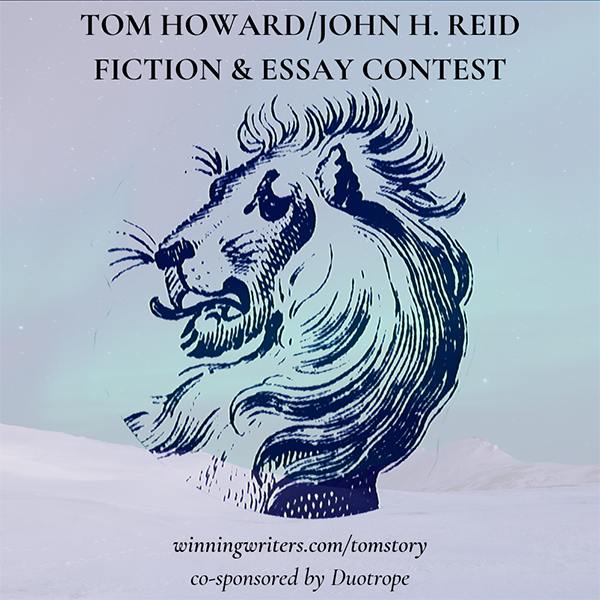
-
Sponsored by Winning Writers and Duotrope
-
Final judge: Dennis Norris II
-
Both published and unpublished work accepted
-
$8,000 in total prizes
-
Top 12 entries published online
-
Fee per entry: $20
-
Submit online by April 30
|
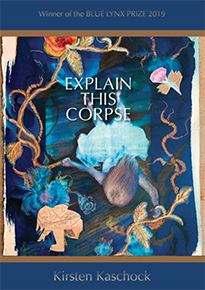
Deadline: June 15
The reading period for the 2021 Blue Lynx Prize for Poetry is open. The competition awards $2,000 plus publication for an unpublished, full-length poetry collection by a US author, which includes foreign nationals living and writing in the US and US citizens living abroad. Each entrant will receive a book from our back catalog.
Past winners include Heather Sellers, Kirsten Kaschock, Joe Wilkins, Jim Daniels, Carolyne Wright, Suzanne Lummis, and Lue Lipsitz. Judges have included Yusef Komunyakaa, Melissa Kwasny, Christopher Buckley, Dara Wier, Dorianne Laux, and Robert Wrigley.
Lynx House Press has been publishing fine poetry and prose since 1975. Our titles are distributed by the University of Washington Press.
Manuscripts may include poems that have appeared in journals, magazines, or chapbooks. Poems that have previously appeared in full-length, single-author collections are not eligible. Acknowledgments pages and author names may be included. Entries must be at least 48 pages in length.
Mail your manuscript and $28 reading fee (payable to Lynx House Press) to Blue Lynx Prize for Poetry, P.O. Box 96, Spokane, WA 99210 or submit online via Submittable.
|
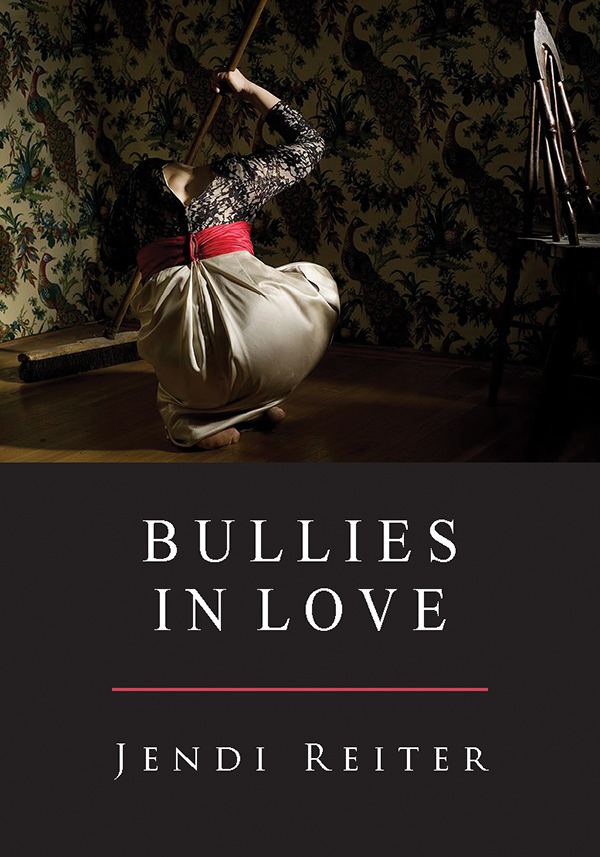
Jendi Reiter's second full-length collection, with fine art photography by Toni Pepe, is published by Little Red Tree.
Poet Carol Smallwood says, "The writing dazzles, surprises, and beguiles the reader with its unexpected vistas. The photography questions what we see; the poems question the ever present role of sex, probe comfortable personal assumptions and our collective cultural fairy tales."
Please enjoy this sample poem and purchase Bullies in Love on Amazon.
Lost Cat
after Amy Hwang, The New Yorker, September 19, 2011
A cat in a turtleneck regards a poster of himself,
thinking, I'm not lost,
I moved on to better things.
This is a New Yorker cartoon,
so the cat has probably been in therapy
where he learned to reframe his four-legged past
like an ex-wife snipping one face from her photos.
We can assume he holds the correct views.
Republicans rarely wear turtlenecks.
Little girls have been known to lose their faith
when their cat runs away.
Some break down glimpsing the garbage truck
that maybe crushed the love from their limp friend,
God muscling the wheel
in the high cab, rolling on.
For others it's the priest or aunt
fortressed in starched lace,
duty-bound to insist
there's no pet heaven.
No wonder the cat put on shoes.
What if he wanted to walk into a bar?
What if he needed a new punchline
at the Pearly Gates?
The devils in funny-hell are just working stiffs.
One cat more or less in the inbox
is nothing to them.
They pass eternity one panel at a time
with sarcastic remarks,
like aunts only with beards and no clothes.
A game can be lost, and a key,
a race and a chance.
What was once called maidenhead.
The point of a joke.
The priests and the aunts plaster up
this label though they know exactly
where those so-called are headed:
worse than a hump of desert island
with a desperate man and one coconut palm.
Someplace not funny at all.
Do you know Jesus?
If found, call.
The girl in the turtleneck
in the city doesn't believe
she's going to the same heaven
as those subscribers. She is lost
like a phone call,
a signal, virginity, the cat
who, she still hopes,
missed her too.
|
|
Some contests are best suited to writers at the early stages of their careers. Others are better for writers with numerous prizes and publications to their credit. Here is this month's selection of Spotlight Contests for your consideration:
Emerging Writers
Victor Howes Prize in Poetry. The New England Poetry Club will award $1,000 for a poem by an undergraduate English major currently enrolled at a New England college (2-year or 4-year). Due February 28.
Intermediate Writers
NEA Literature Fellowships. The National Endowment for the Arts will award up to sixty $25,000 grants to published creative writers to help them set aside time for writing, research, travel, and general career advancement. Program alternates annually between poetry and prose (fiction and creative nonfiction); 2021 applications are for prose. Applicants must be US citizens or permanent residents. Due March 10.
Advanced Writers
Ungar German Translation Award. The American Translators Association will award $1,000 for a distinguished book-length literary translation from German into English. Entries may be poetry or literary prose. Entries must have been published in the US in the two years prior to the deadline, and translators should be US citizens or permanent residents. Publishers should send 3 copies of the book plus supporting materials and excerpts from the original language. Due March 8.
See more Spotlight Contests for emerging, intermediate, and advanced writers within The Best Free Literary Contests database.
|
|

|
Winning Writers finds open submission calls and free contests in a variety of sources, including Erika Dreifus' Practicing Writer newsletter, FundsforWriters, Trish Hopkinson's blog, Erica Verrillo's blog, Authors Publish, Lambda Literary, Lit Mag News Roundup, Poets & Writers, The Writer, Duotrope, Submittable, and literary journals' own newsletters and announcements.
• RHINOart2art Project
(artwork responding to poems in the journal's archives - rolling deadline)
• Inkshares All-Genre Contest
(fiction and nonfiction manuscripts to be judged by website member votes - February 28)
• Misfit Magazine
(contemporary narrative poetry and free verse - February 28)
• WayWords
(poetry, fiction, and essays about "heritage" - March 15)
• 20.35 Africa Anthology
(poems by African writers aged 20-35 - March 16)
• Rattle: "Indian Poets" Issue
(poems by authors who were born in India or have lived there for a significant time - April 15)
• Sequestrum "Slipstream" Issue
(poetry and prose that crosses genre boundaries of sci-fi, fantasy, and literary writing - April 15)
• Sinister Wisdom: "Trans/Feminisms" Issue
(poetry, prose, art, comics, and interviews celebrating transness and its intersection with feminism - April 15)
• Tales for Love: Nature Writing Anthology
(poetry and fiction about finding hope in nature during the pandemic - April 15)
• The Best New True Crime Stories: Partners in Crime
(narrative journalism about lawbreaking couples - June 1)
• Black Lawrence Press: Black Womanhood Anthology
(essays problematizing the "strong Black woman" trope - June 30)
• The Best New True Crime Stories: Unsolved Crimes and Mysteries
(narrative journalism about cold cases - September 1)
• Aesthetic Press
(commercial fiction manuscripts by BIPOC - January 1, 2022)
|
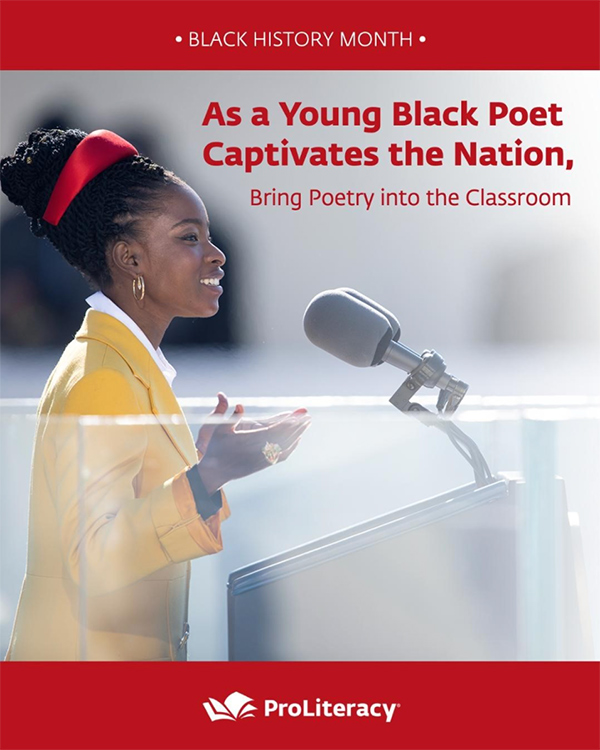
National Youth Poet Laureate Amanda Gorman captivated the nation last month with the performance of her poem "The Hill We Climb" at the inauguration of President Joe Biden. Gorman's inaugural poem ignited the public's interest in not only her, but in poetry.
As we celebrate Black History Month, and we think about poetry, it's important to note that for hundreds of years, poetry has been used to talk about the collective experiences of the Black community. In the essay "200 Years of Afro-American Poetry", Black American poet Langston Hughes wrote how Black poetry has historically been utilized as a tool to protest inequality.
Now is a great time to examine how you can use poetry in your literacy lessons.
Some students—and teachers—tend to shy away from poetry, but poetry is a great medium to teach adult learners at varying reading levels. Without getting lost in a poet's intended purpose for writing the poem, Nancy Padak's "Poetry in the Adult Literacy Classroom" outlines how you can use poetry to aid in reading and writing instruction.
Comprehension: It's natural to have a response to a poem, and responding to what you have read is key to comprehension. You should be able to use poetry with many different comprehension activities that you already use in your classroom.
Fluency: Poems are easy to read and reread many times over. By doing this, students build fluency, which we know is critical to becoming a good reader.
Phonics: For beginning readers, learning word parts, sounds, and families is very important. This can be accomplished through poems that rhyme.
Writing: Students can practice writing by responding to a poem. This also serves as a nice comprehension check. In addition, ask students to write their own poetry. This can be a fun activity, and there are several types of poems that can add variety to your lesson.
While looking for poetry to use, there's plenty of Black poets to choose from. Some of the more well-known poets include Hughes, Gwendolyn Brooks, Maya Angelou, and Robert Hayden. You will find a list of poems by each at the bottom of their author page. In addition, the Poetry Foundation has an
extensive collection of poetry, articles, educational resources, and podcasts honoring Black History Month.
|
Poems to See By features 24 classic poems with visual interpretations by comic artist Julian Peters. Mr. Peters has graciously allowed us to reprint "Spring and Fall" from the book.
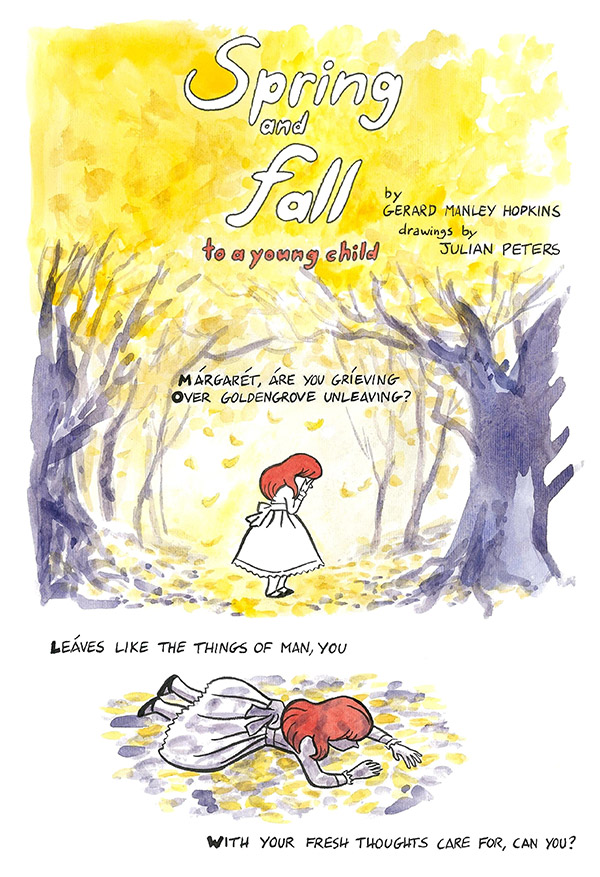
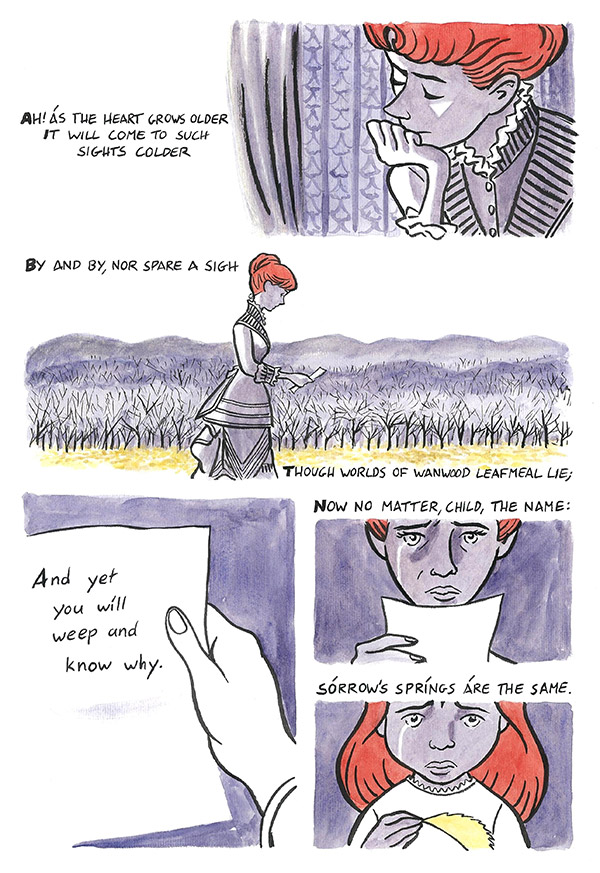
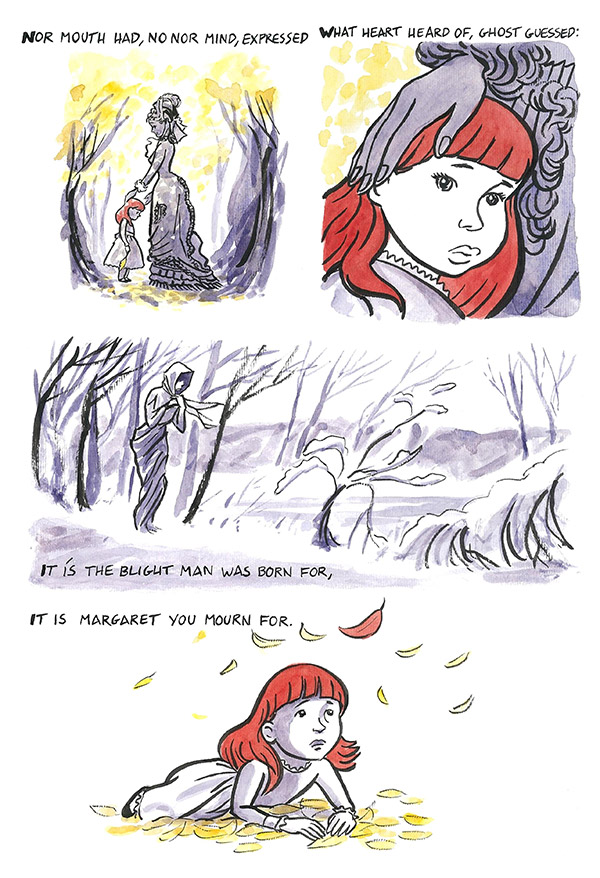
|
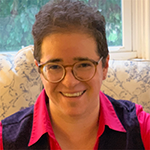
Lesléa Newman's I Wish My Father Is a Tragicomic Elegy
Shepherding an elderly parent through illness and death is a stark, unglamorous journey that demands clear vision and directness, and (especially if you're a Jewish New Yorker) a fair amount of gallows humor. These qualities abound in Lesléa Newman's latest poetry collection, I Wish My Father (Headmistress Press, 2021).
Dedicated to Edward Newman (1927-2017), a dapper and hardworking New York attorney, this sequence of narrative poems cycles repeatedly through grief, frustration, and absurd humor, as his adult daughter endeavors to preserve his dignity and safety (not always compatible goals) while his grasp of reality weakens.
Read Jendi's full review and a poem from the book here.
Jendi Reiter is the editor of Winning Writers.
Follow Jendi on Twitter at @JendiReiter.
|
|
|
|
 We found three dozen excellent free poetry and prose contests with deadlines between February 15-March 31. In this issue, please enjoy "Spring and Fall" by Gerard Manley Hopkins, illustrated by Julian Peters.
We found three dozen excellent free poetry and prose contests with deadlines between February 15-March 31. In this issue, please enjoy "Spring and Fall" by Gerard Manley Hopkins, illustrated by Julian Peters. Thanks so much for all of you who helped us get our Twitter feed back online after we made a mistake in our profile. Some people even went to the trouble of sending letters to Twitter in San Francisco!
Thanks so much for all of you who helped us get our Twitter feed back online after we made a mistake in our profile. Some people even went to the trouble of sending letters to Twitter in San Francisco!















